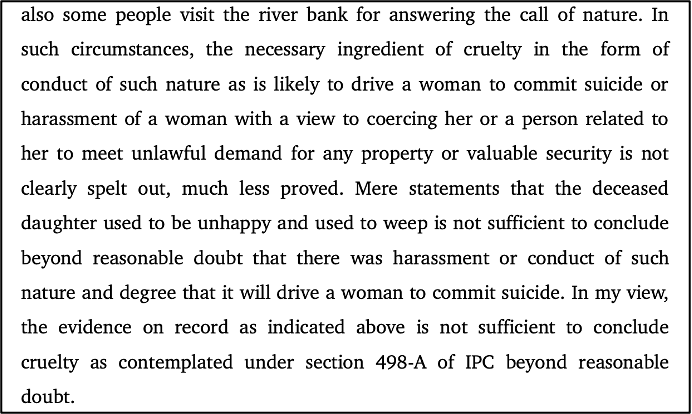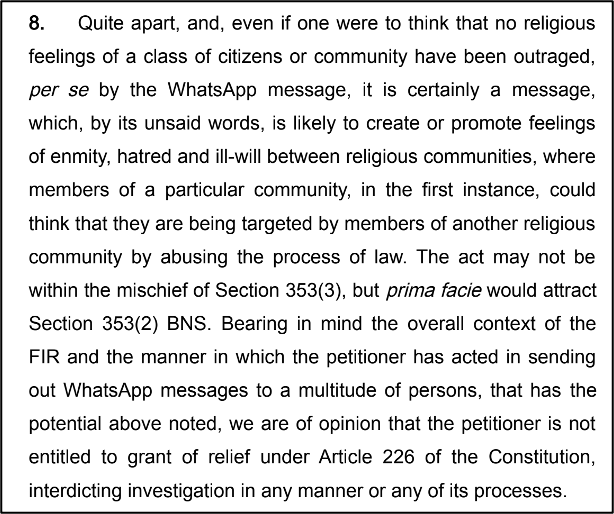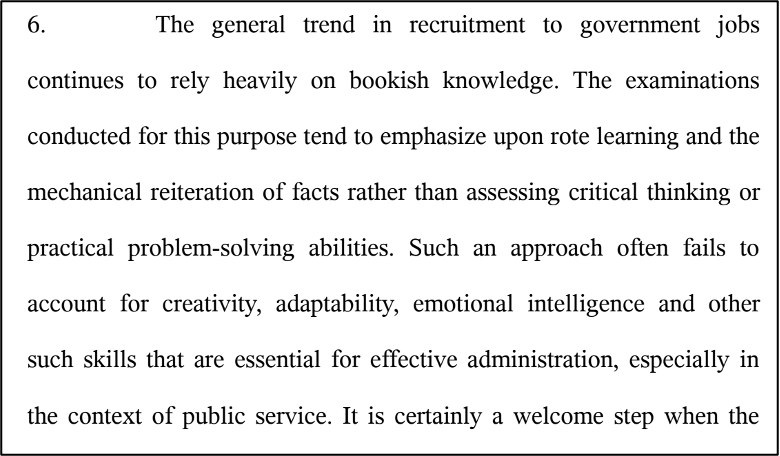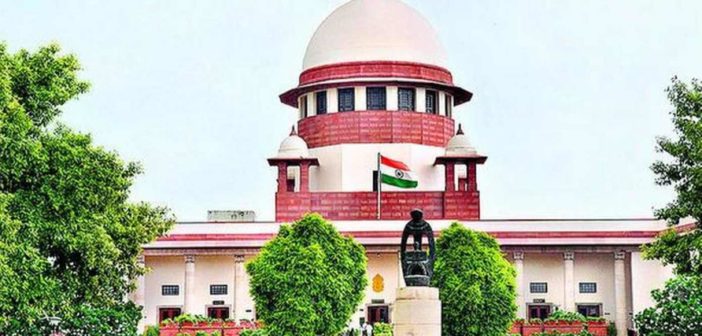In this edition of the court judgments review, we examine the Supreme Court’s ruling that biometric Attendance System does not become illegal just because employees were not consulted before introduction, Bombay HC’s order that mere statements that the deceased daughter used to be unhappy and used to weep are not sufficient for convicting husband and family under Section 498-A IPC, among others.
SC: Biometric Attendance System does not become illegal just because employees were not consulted before introduction
The case, Union of India and Ors. vs. Dilip, originated when the Office of the Principal Accountant General (A&E), Odisha, introduced a Biometric Attendance System (BAS) starting from 01 July 2013, via official circulars. The employees of the office challenged the implementation of this system by filing an application with the Central Administrative Tribunal, which dismissed their petition, stating it was not related to service conditions and was therefore not maintainable.
The employees argued before the High Court that the circulars introducing the new attendance system were invalid because they were issued without prior consultation with the staff and did not comply with the Complete Manual on Establishment and Administration for Central Government Offices. The High Court agreed with the employees. The Union of India then challenged this High Court order in the Supreme Court, arguing that the Manual did not contain any specific rules violated by the BAS introduction.
The Supreme Court noted that since the employees had “no objection” to the new system, there was no real conflict left to resolve. The issue for the employees was the lack of consultation before introducing the system. The Court felt the High Court’s decision to cancel the BAS circulars was “totally unnecessary.” It ruled that even if the staff wasn’t consulted beforehand, this alone didn’t make the new system illegal, especially since the system benefits everyone involved. The Supreme Court agreed with the Union of India and set aside the High Court’s earlier order allowing the Office of the Principal Accountant General to immediately go ahead and put the BAS into effect, as planned in its original circulars.

Bombay HC: Mere statements that the deceased daughter used to be unhappy and used to weep are not sufficient for convicting husband and family under Section 498-A IPC
The case, Ramprakash vs. State of Maharashtra, is an appeal filed by Ramprakash (Appellant), who was the husband of the deceased, Rekha. He was convicted by a lower court for subjecting Rekha to cruelty under Section 498-A IPC and encouraging her to commit suicide under Section 306 IPC. The prosecution’s case was that the husband and his mother subjected Rekha to cruelty, demanding money for household expenses and a sewing machine, which led her to commit suicide by jumping into a river in November 1997. The husband had lodged a missing persons report the day she went missing, and the father of the deceased lodged a complaint after the body was found.
The Appellant argued that the allegations of cruelty were vague and general, lacking specific details. He contended that the element of abetment was not proven, and that the alleged ill-treatment was not severe enough to drive a person to suicide. He also raised the possibility that Rekha was unhappy with him because she desired a “better looking and handsome husband” and a better house, or that she fell into the river accidentally. The State defended the conviction, relying on the evidence of Rekha’s parents regarding the demands for money and the sewing machine, and their testimony that Rekha was unhappy and used to weep.
The High Court observed that there was “sufficient doubt” in the prosecution’s case. It noted that the evidence from the deceased’s parents mentioned only one instance of demanding and receiving Rs. 1,000, and no specific acts of physical or mental cruelty were proven beyond her being unhappy and weeping. The Court also noted that the parents did not mention any ill-treatment to the police when the initial missing person report was filed. The judges concluded that simply stating a daughter was unhappy and wept is not sufficient to prove the kind of harassment or mental torture needed to warrant a conviction for cruelty or abetment to suicide.
The High Court allowed the appeal filed by Ramprakash while setting aside the judgment of the Additional Sessions Judge. The Appellant was acquitted of all charges under the Indian Penal Code.

Kerala HC: The prefix “Dr.” mentioned should not be used by Physiotherapists and Occupational Therapists without a recognised medical qualification
The Indian Association of Physical Medicine and Rehabilitation (IAPMR) filed a petition seeking a temporary order against the use of the prefix ‘Dr.’ by Physiotherapists and Occupational Therapists. The petitioner also sought to restrict these professionals from claiming to be the ‘first health care provider’ and ensure they only work as a supporting group under qualified medical professionals.
According to IAPMR, the use of the ‘Dr.’ prefix by Physiotherapists and Occupational Therapists, as mentioned in their competency-based curriculum, violated the Indian Medical Degrees Act, 1916. The petitioner highlighted a previous government order, which was later withdrawn, that also noted this violation.
The Kerala High Court noted that there appears to be a clear conflict between the provisions of the Indian Medical Degrees Act, 1916, and the curriculum for Physiotherapy and Occupational Therapy. The Court found that the petitioner had made a prima facie case. The Court admitted the petition for hearing. Meanwhile, the competent authorities were directed to ensure that the prefix “Dr.” is not used by Physiotherapists and Occupational Therapists unless they hold a recognised medical qualification.

Allahabad HC: WhatsApp message conveying targeting of a particular religious group has the potential to create feelings of enmity between religious groups
The petition, Afaq Ahmad vs. State of Uttar Pradesh and others, was filed by the petitioner to dismiss the First Information Report lodged against him. The FIR was filed after Afaq sent an inflammatory message via WhatsApp to several locals in Chandpur following the arrest of his brother, Arif, in a separate case related to unlawful religious conversion. The police alleged that Afaq’s message was intended to disturb communal peace and outrage religious feelings.
The Petitioner argued that his WhatsApp message was not inflammatory and only showed resentment over his brother’s arrest, asserting his full faith in the judicial process. He claimed the FIR was lodged to falsely implicate him after his brother’s arrest. The State vehemently opposed the petition, arguing that the matter required investigation.
The Court observed that while the message may not explicitly use religious words, its “unsaid words” conveyed a subtle message that the petitioner’s community was being unfairly targeted through the abuse of legal process. The Court ruled that this message had the potential to create or promote feelings of enmity and hatred between religious communities.
The High Court held that the case requires a thorough investigation and cannot be stopped at an initial stage. The Court dismissed the writ petition, thereby refusing to quash the FIR and allowing the police investigation against Afaq Ahmad to continue.

Punjab & Haryana HC: Inclusion of general awareness a welcome step, as it helps to gauge a candidate’s overall intelligence essential for public service.
The case Amit Ahalawat vs. State of Haryana is regarding the syllabus for an examination. The petitioner is an applicant with a degree in Civil Engineering, who challenged the new exam pattern for the post of Assistant Environmental Engineer by the Haryana State Pollution Control Board. The recruitment process involved three stages: a screening test, a subject knowledge test, and an interview. The petitioner objected that the screening test syllabus focused on general knowledge and history, completely excluding relevant engineering subjects.
The Petitioner argued that the new syllabus had no rational connection to the technical post and that the previous recruitment cycle included engineering subjects. The Respondent (HPSC) countered that the previous exam left too many posts vacant, leading them to simplify the screening test to merely shortlist candidates with a requirement of 25% marks. They argued that testing general knowledge is acceptable for Group B posts and is the prerogative of the expert recruiting body.
The Court acknowledged the petitioner’s grievance but upheld the HPSC’s right to set the criteria. The Court noted that the general trend in government recruitment often relies too heavily on “bookish knowledge” and “rote learning,” which fails to assess critical thinking or practical skills. The Court considered the inclusion of general awareness a welcome step, as it helps to gauge a candidate’s overall intelligence, analytical skills, and constitutional sensibility, which are essential for public service. The Court reiterated that the screening test was only for shortlisting and its marks did not count toward the final result.
Finding no legal flaw in the HPSC’s decision, the High Court dismissed the writ petition. It ruled that the decision to include general awareness to select “all-rounded candidates” was justifiable and did not violate the Constitution.




